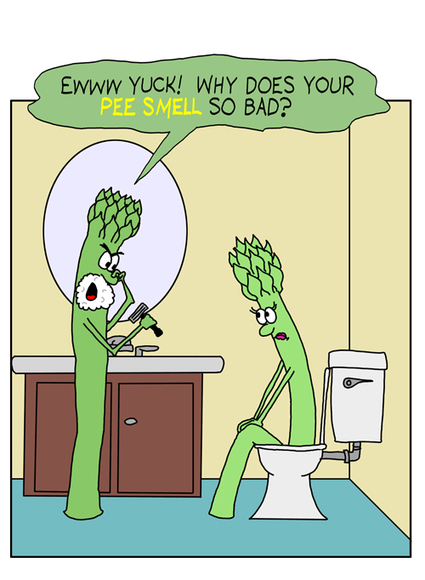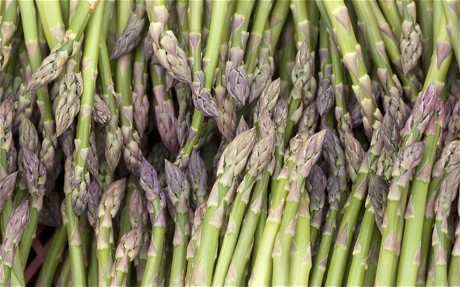Asparagusic acid, when digested, is broken down into many sulfur compounds. These compounds are similar to the compounds produced in garlic and skunk spray (Who knew we would ever have something in common with skunks...). These sulfur compounds are volatile, which means they are turned into vapor (gas) particles. When thou proceeds to urinate upon the golden thrown, these vapors escape from the liquid urine and waft into the air. This vapor contains that funky, asparagus pee odor. 
BUT. Did you know: 20-40% of the human population cannot smell the unusual aroma of pee after eating asparagus?
In the 1980’s a pair of studies were conducted with participants from France and Israel. They were told to eat asparagus and asses not only the scent of their own pee, but also the scent of the other participants pee. What they found was that a minority of the participants could, in fact, not smell the odor. Although, the people who could smell the asparagus odor of their own pee, could also smell the odor in the participants pee who could, not, smell the odor. This indicated that the differences were rooted within the people's perception, not production.
It has been said that humans have relied so strongly on their sense of sight that their sense of smell has devolved and that these people simply do not contain the gene.
A genetic sequencing company called 23andMe conducted a more recent study in 2010. They asked nearly 10,000 customers if they noticed any scent in their urine after eating asparagus. The researchers looked for genetic similarities among those who didn't notice the scent. What they found was fascinating. It appears to stem from a single genetic mutation, a switched base-pair among a cluster of 50 different genes.
It seems that asparagus pee has been a topic of conversation for centuries. Benjamin Franklin took note, stating in a letter to the Royal Academy of Brussels in 1781: "A few Stems of Asparagus eaten, shall give our Urine a disagreeable Odour." Apparently, he was trying to convince the academy to “To discover some Drug…that shall render the natural Discharges of Wind from our Bodies, not only inoffensive, but agreeable as Perfumes.” A goal that, I am sure most of us can agree to, modern science has still not achieved.
Marcel Proust, a French novelist also had an opinion about asparagus pee odor. In 1913, he said that asparagus had the effect of transforming his “humble chamber pot into a bower of aromatic perfume”. I guess the aroma does not put off everyone!
The fact of the matter is, it is a win/win scenario whether you can smell your smelly pee or not. If you can smell the fragrance, congratulations, your smell genes have evolved, if not, lucky you, a tasty treat without the stinky consequences.
